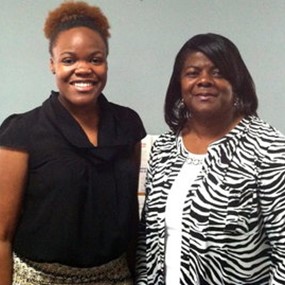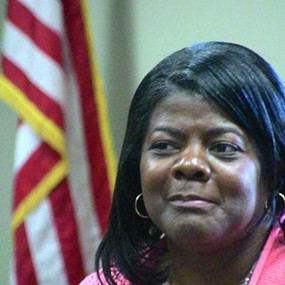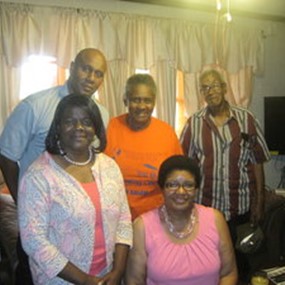Edmundite Missions has a Mission to Serve
As of this year, Dallas County has a poverty rate of 31.3 percent, according to Alabama Possible, a non-profit organization that serves as a resource to educate communities and reduce systemic poverty across Alabama. More than 40 percent of families live below the poverty level.
Even though the poverty rate is perilous, Selma has taught me that the city is indeed progressing and continuing to function because of the relationships it has with agents in the community.
The plight of the poor is not being ignored.
Since 1937, Edmundite Missions has been committed to helping improve the quality of life for those who have been affected by systemic poverty. From feeding those who are hungry to welcoming those who suffer from homelessness with a place of safety and rest, they are here to serve.
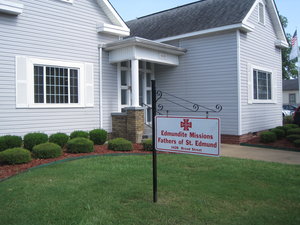
The median household income of Selma residents is less than half of the state of Alabama, indicating that many families may struggle accessing essentials for daily living including medical care.
“Anything healthcare related is always a plus that you can find as a resource to give to clients,” said Angela Hurst, corporate foundation and government relations officer for Edmundite Missions.
Working through a partnership between Lion’s Club International and The University of Alabama at Birmingham’s Optometry program, Edmundite Missions was able to provide more than 60 uninsured residents with eye care services and glasses.
While offering the opportunity for people to access specialized services that otherwise lie beyond their means, the Missions’ partnership extended past the community and provided optometry students the opportunity to gain real-world experience in their field.
One of the largest 501(3)c of its kind in the area, Edmundite Missions was founded 77 years ago by Father Frank Casey, S.S.E. and began as an outreach ministry for African Americans in the Deep South who were affected by poverty.
Edmundite Missions has worked alongside Selmians since before the civil rights events that led to “Bloody Sunday” and the Voting Rights Act of 1965 and continued to support the African American community despite criticism and threats from the Ku Klux Klan and others.
Eventually the organization shifted its focus to the entire community. Although it is Catholic-based, it extends its generosity to anyone in need regardless of religious orientation.
The Missions created several programs and initiatives that serve the Selma community on a daily basis, including their Bosco Nutrition Center, Catholic Social Services and Senior Activities Center, all located on Broad Street.
Growing up, I remember there were times when money was tight in my household, but I have never been without the things I need, especially food. I was blessed to be so fortunate, but there are many people, old and young, who face a different reality in Selma. Over 60 percent of the children live below the poverty line.
“One-hundred percent of the student population qualifies for free or reduced lunch,” said Hurst.
During the school year, parents depend on the schools to provide the core meal their children will eat each day throughout the week. When the school year ends, many children wonder where that meal will come from because sometimes their parents have come upon hard times and aren’t able to provide steady meals.
The Bosco Nutrition Center welcomes those children to come enjoy a balanced and nutritious meal for lunch and dinner 365 days a year, 7 days a week.
“If they don’t eat some place other than home, they don’t eat,” Hurst said, “So, in the summer time, we get a lot of kids that come through.”
Single parents, working class families, senior citizens and many more are also welcomed in to enjoy free meals. Currently, the Bosco Nutrition Center serves about 1,000 people per day.
The organization is guided by the words of Jesus found in Matthew 25:35-36: “For I was hungry and you gave me something to eat, I was thirsty and you gave me something to drink, I was a stranger and you invited me in, I needed clothes and you clothed me, I was sick and you looked after me, I was in prison and you came to visit me.”
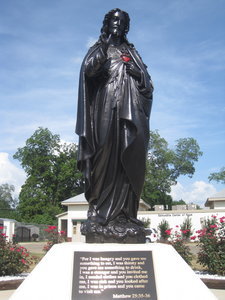
The Edmundite Missions gives back to the community in other ways as well. They work with the Selma Police Department to provide security for their facilities, they pay city, county and state taxes that go back into Selma’s economy, and contract with local businesses to provide other services they may need.
None of their work would be possible without a strong lifeline of support from people who care just as much about Selma and desire to give to those who are less fortunate than themselves. Edmundite Missions has developed relationships with countless individuals and organizations that contribute to their cause. They currently have between 60,000 and 65,000 regular donors.
Edmundite Missions is threaded into the fabric that dresses the Queen City, and doesn’t plan on unraveling any time soon.
Hurst said, ‘If the Missions closed its doors, I can’t even imagined what that would mean for the city of Selma. Where would those people go?”
Selma’s poverty rate will not change overnight, but every little thing counts, every helping hand matters. One simple act of love can produce more than enough hope to reach a higher level of faith to make the difference of a lifetime.
And so, the Missions’ will continue to cling to their motto: “Do the best we can, with what little we have, to serve those most in need.”
Tags: Selma
